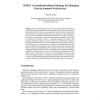Free Online Productivity Tools
i2Speak
i2Symbol
i2OCR
iTex2Img
iWeb2Print
iWeb2Shot
i2Type
iPdf2Split
iPdf2Merge
i2Bopomofo
i2Arabic
i2Style
i2Image
i2PDF
iLatex2Rtf
Sci2ools
114
click to vote
ESWS
2006
Springer
2006
Springer
WSTO: A Classification-Based Ontology for Managing Trust in Semantic Web Services
The aim of this paper is to provide a general ontology that allows the specification of trust requirements in the Semantic Web Services environment. Both client and Web Service can semantically describe their trust policies in two directions: first, each can expose their own guarantees to the environment, such as, security certification, execution parameters etc.; secondly, each can declare their trust preferences about other communication partners, by selecting (or creating) `trust match criteria'. A reasoning module can evaluate trust promises and chosen criteria, in order to select a set of Web Services that fit with all trust requirements. We see the trust-based selection problem of Semantic Web Services as a classification task. The class of selected Semantic Web Services (SWSs) will represent the set of all SWSs that fit both client and Web Service exposed trust requirements. We strongly believe that trust perception changes in different contexts, and strictly depends on the...
| Added | 22 Aug 2010 |
| Updated | 22 Aug 2010 |
| Type | Conference |
| Year | 2006 |
| Where | ESWS |
| Authors | Stefania Galizia |
Comments (0)

